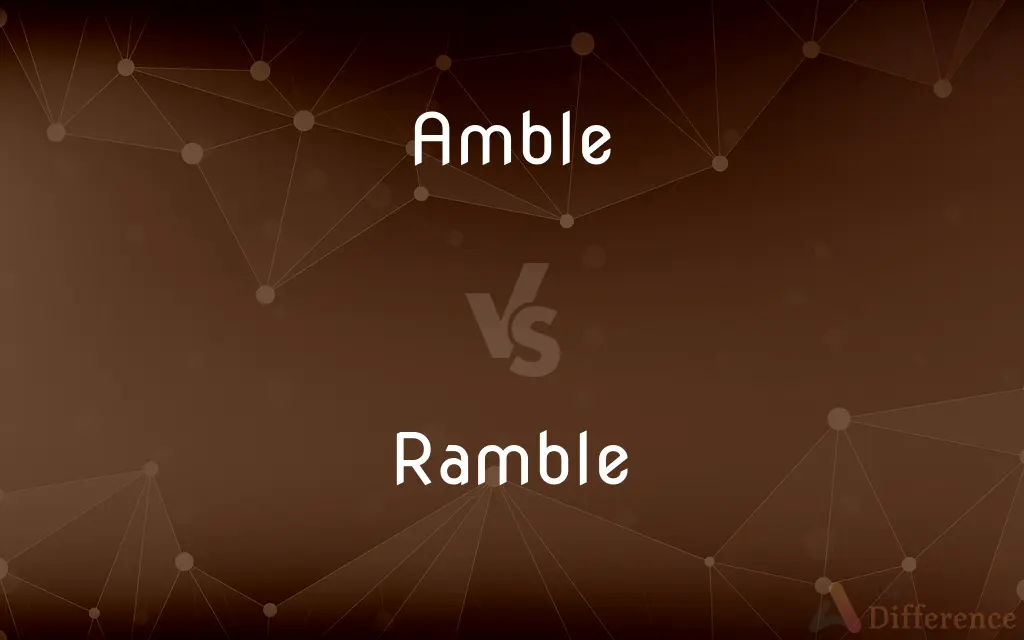Amble vs. Ramble — What's the Difference?
By Fiza Rafique & Maham Liaqat — Updated on April 20, 2024
"Amble" refers to walking at a slow, relaxed pace, typically for enjoyment, while "ramble" means to walk or talk aimlessly or at length, often without a clear direction or purpose.

Difference Between Amble and Ramble
Table of Contents
ADVERTISEMENT
Key Differences
An amble is a leisurely walk taken at a slow pace, often for pleasure or relaxation. On the other hand, a ramble involves walking, but it can also describe speaking in a wandering, often lengthy manner, without a direct focus.
When someone ambles, the emphasis is on the relaxed and enjoyable nature of the walk, often in a scenic or pleasant environment. Conversely, rambling suggests a lack of clear direction or purpose, which can apply to physical movement through an area or a conversational style that lacks conciseness.
Ambling is typically a deliberate choice to enjoy a tranquil or leisurely experience, possibly to appreciate one's surroundings or engage in quiet reflection. Whereas, rambling, especially in speech, can indicate a person's difficulty in expressing thoughts concisely or staying on topic.
In literature and descriptions of nature walks, ambling is used to set a calm, serene mood. In contrast, rambling might be used to describe a more adventurous or exploratory journey, often without a predetermined path.
While ambling connotes a physical activity done at one's own pace and comfort, rambling can be seen as either a positive exploration or a negative lack of efficiency and purpose, depending on the context.
ADVERTISEMENT
Comparison Chart
Definition
Walking at a slow, leisurely pace
Walking or speaking aimlessly
Connotation
Relaxation and enjoyment
Lack of direction or purpose
Usage Context
Leisure activities, scenic walks
Describing aimless walks or lengthy, unfocused talk
Focus
Enjoyment of the walk itself
The act of moving or talking without clear intent
Associated
Peaceful, tranquil experiences
Adventurous or potentially disorganized thoughts
Compare with Definitions
Amble
To move at a leisurely, comfortable pace.
They liked to amble through the old town's streets on weekends.
Ramble
Speak or write at length in a confused or inconsequential way.
He rambled on about various topics during the meeting.
Amble
A casual, easy-going stride.
She ambled into the room with a smile.
Ramble
Move or talk in a wandering manner.
She rambled through her presentation, losing the audience's interest.
Amble
A slow, relaxed pace of walking.
His amble through the park cleared his mind.
Ramble
Characterized by aimless, lengthy exploration.
His thoughts rambled as he tried to focus on writing.
Amble
Walk leisurely.
They ambled along the riverbank, enjoying the sunset.
Ramble
To walk for pleasure, typically without a definite route.
They rambled through the woods all afternoon.
Amble
A relaxed, unhurried manner of moving.
He ambled over to greet us.
Ramble
A leisurely walk or journey without specific purpose.
Their weekend ramble took them to unknown parts of the city.
Amble
Amble is a town on the North Sea coast of Northumberland, England, at the mouth of the River Coquet; Coquet Island is visible from its beaches and harbour. In 2011, it had a population of 6,025.
Ramble
To move about aimlessly
Rambled around the park for an hour.
Rambled around the southwest.
Amble
To walk slowly or leisurely; stroll.
Ramble
To walk casually or leisurely
Rambled over to the neighbor's house.
Amble
To move along at an easy gait by using both legs on one side alternately with both on the other. Used of a horse.
Ramble
To follow an irregularly winding course of motion or growth
Vines rambled over the fence.
Amble
An unhurried or leisurely walk.
Ramble
To speak or write at length and with many digressions
Rambled on about his childhood.
Amble
An easy gait, especially that of a horse.
Ramble
To move about aimlessly through or over
Rambled the back streets of town.
Amble
An unhurried leisurely walk or stroll.
Ramble
A leisurely, sometimes lengthy walk.
Amble
An easy gait, especially that of a horse.
Ramble
A leisurely stroll; a recreational walk in the countryside.
Amble
(intransitive) To stroll or walk slowly and leisurely.
Ramble
A rambling; an instance of someone talking at length without direction.
Amble
(intransitive) Of a quadruped: to move along by using both legs on one side, and then the other.
Ramble
(mining) A bed of shale over the seam of coal.
Amble
To go at the easy gait called an amble; - applied to the horse or to its rider.
Ramble
A section of woodland suitable for leisurely walking.
Amble
To move somewhat like an ambling horse; to go easily or without hard shocks.
The skipping king, he ambled up and down.
Sir, your wit ambles well; it goes easily.
Ramble
To move about aimlessly, or on a winding course
Amble
A peculiar gait of a horse, in which both legs on the same side are moved at the same time, alternating with the legs on the other side.
Ramble
To walk for pleasure; to amble or saunter.
Amble
A movement like the amble of a horse.
Ramble
To lead the life of a vagabond or itinerant; to move about with no fixed place of address.
Amble
A leisurely walk (usually in some public place)
Ramble
To talk or write incessantly, unclearly, or incoherently, with many digressions.
Francine has a tendency to ramble when it gets to be late in the evening.
Amble
Walk leisurely
Ramble
To follow a winding path or course.
The river rambled through the mountains.
Ramble
To walk, ride, or sail, from place to place, without any determinate object in view; to roam carelessly or irregularly; to rove; to wander; as, to ramble about the city; to ramble over the world.
He that is at liberty to ramble in perfect darkness, what is his liberty better than if driven up and down as a bubble by the wind?
Ramble
To talk or write in a discursive, aimless way.
Ramble
To extend or grow at random.
Ramble
A going or moving from place to place without any determinate business or object; an excursion or stroll merely for recreation.
Coming home, after a short Christmas ramble.
Ramble
A bed of shale over the seam.
Ramble
A section of woods suitable for leisurely walking.
Ramble
A type of dance; as, the Muskrat ramble.
Ramble
A leisurely walk (usually in some public place)
Ramble
Continue talking or writing in a desultory manner;
This novel rambles on and jogs
Ramble
Move about aimlessly or without any destination, often in search of food or employment;
The gypsies roamed the woods
Roving vagabonds
The wandering Jew
The cattle roam across the prairie
The laborers drift from one town to the next
They rolled from town to town
Common Curiosities
What is the main difference between ambling and rambling?
Ambling specifically refers to walking slowly and leisurely, while rambling involves wandering either physically or verbally without a set purpose.
Can both ambling and rambling be forms of exercise?
Yes, both can be forms of light exercise; ambling focuses on a leisurely pace, while rambling may cover more ground or topics.
What might inspire someone to ramble?
A desire for exploration, either of thoughts or environments, or difficulty in organizing thoughts succinctly.
What is the social aspect of ambling?
Ambling can be a social activity, often enjoyed with friends or family as a form of spending quality time together.
Can ambling be therapeutic?
Yes, ambling can serve as a therapeutic activity, helping individuals to unwind and relax.
Are there any benefits to ambling?
Yes, ambling can reduce stress, improve mood, and offer physical benefits from the gentle exercise.
What type of setting is ideal for an amble?
Peaceful settings like parks, quiet neighborhoods, or beaches are ideal for ambling.
Is rambling considered a negative trait in communication?
It can be, particularly in professional or formal settings where conciseness and clarity are valued.
How can rambling affect communication?
It can lead to misunderstandings or frustration if the listener is unable to follow the speaker's thoughts.
How can one enjoy an amble?
By choosing a scenic route and walking at a pace that allows for relaxation and enjoyment of the surroundings.
Can rambling be creative?
Yes, rambling can be seen as a form of creative exploration, particularly in writing or brainstorming ideas.
What does it mean when someone is described as rambling in a meeting?
It means they are speaking at length without a clear direction, which may be inefficient or distracting.
Is ambling always slow?
Typically, yes, ambling is characterized by a slow and relaxed pace.
How do rambles usually end?
Rambles may not have a specific ending point, often concluding when the person feels satisfied or tired.
What should one wear for an amble or ramble?
Comfortable clothing and shoes suitable for walking, tailored to the weather and terrain.
Share Your Discovery

Previous Comparison
Augur vs. Portend
Next Comparison
Grovelling vs. SycophanticAuthor Spotlight
Written by
Fiza RafiqueFiza Rafique is a skilled content writer at AskDifference.com, where she meticulously refines and enhances written pieces. Drawing from her vast editorial expertise, Fiza ensures clarity, accuracy, and precision in every article. Passionate about language, she continually seeks to elevate the quality of content for readers worldwide.
Co-written by
Maham Liaqat













































